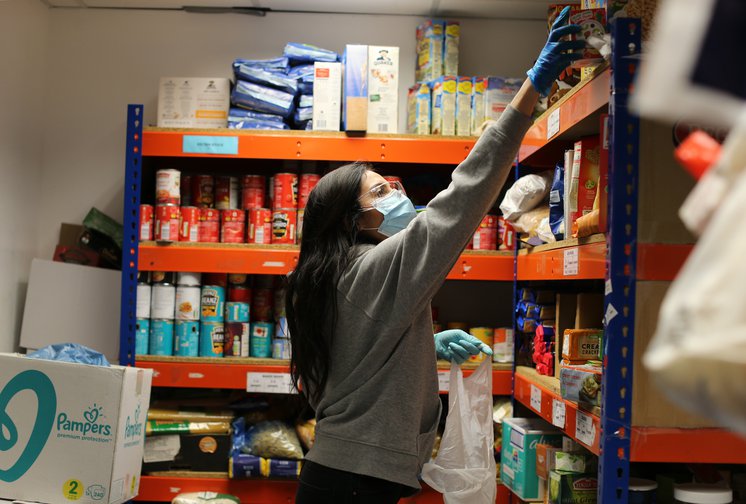How to fix the UK's hunger crisis
The number of people relying on food banks has risen to historic proportions since the start of the pandemic – but the problem didn't begin there.
 |
Muddassar Ahmed-23 January 2021
The UK needs to address a shameful secret: even before the pandemic, record numbers of people were seeking help from food banks, increasing by 74% over the past 5 years. Now, as the UN warns of a looming global hunger crisis, practical solutions are needed more urgently than ever.
Despite the UK being the world’s fifth largest economy, one-fifth of its population, or 14.5 million people, live in poverty. By mid-2021, as a consequence of the pandemic, it’s expected that up to 2.6 million will be unemployed. The rate of food poverty is already among the worst in Europe.
As the chair of Bow Food Bank in east London, I can see the vital work being done by volunteer-led charities to fill the gap. A food bank like ours feeds more than 800 adults and 1,500 children each week. Since the start of the pandemic, demand in our part of London, which has the highest poverty rate in the capital, has increased by a staggering 800%.
This isn’t an isolated issue. The Trussell Trust, a charity that supports a national network of food banks, reported an increase of 47% increase in the number of food parcels distributed across the UK in the six months to September 2020. Many of the new food bank users come from middle-income families. Some people are no longer able to afford childcare, some are on zero-hour contracts and others have been made redundant.
Although I’m proud of our hard-working volunteers and generous local funders, I believe it’s the responsibility of the government to make sure that food banks are no longer needed. The rise of food bank usage over the past decade is linked to austerity policies that the UN has accused of forcing millions into poverty, homelessness and hunger. Distressingly, due to years of government negligence, it’s fallen to the public to solve the hunger crisis.
For the first time in its history, the UN children’s fund, UNICEF, has launched an emergency UK plan to help feed British children during the pandemic.
People are starting to speak out about this scandal. For the first time in its history, the UN children’s fund, UNICEF, has launched an emergency UK plan to help feed British children during the pandemic. In October, the Conservative MP Caroline Ansell resigned from her government job over the government’s refusal to extend free school meals into the holidays. At the start of this year, social media was flooded with photos of inadequate food packages supplied by a private contractor on behalf of the state to pupils during lockdown.
Food security and poverty are complex issues that require drastic intervention at national and local level, combined with support from the public, to fix. Right now, we need emergency investment from the government, in partnership with local councils, schools and businesses.
Part of this cash stimulus could be restricted to households beneath a certain income level and valid only for food products, lifting pressure on food banks. The adoption of a cash-first approach, similar to that taken by the Scottish government, would prevent reliance on emergency food aid and enable people to remove themselves from cycles of poverty.
If our government can subsidise the Eat Out to Help Out scheme, it should also be able to look after those who cannot afford to eat anything at all. For example, Bow Food Bank costs £800,000 a year to run. There are more than 2,000 food banks across the UK, of which 40% are independent. If each had a similar budget to ours, funding them directly would only account for 0.5% of the recent £280bn Covid-19 stimulus package.
This investment could be managed by a food security minister – a position that doesn’t currently exist. This new role would help coordinate efforts across government to end hunger: among which would be reversing welfare budget cuts, reforming Universal Credit to eliminate delays and punitive conditions, restructuring income tax for the wealthy and ensuring people are paid a genuine living wage.
The UK's increase in food bank usage over the past decade is linked to austerity policies that the UN has accused of forcing millions into poverty, homelessness and hunger.
In the meantime, food banks need help with communication and outreach, both to recruit volunteers and to let people know they’re available to help. There’s often a lack of communication between local councils and food banks, which means that many communities don’t know they exist. This could be fixed with better-funded and coordinated publicity efforts.
There are other steps we could take right now, such as addressing the absurd insistence by the food industry on cosmetic standards. According to the Soil Association, this leads to between 20% and 40% of all fruits and vegetables being rejected and wasted before they even reach the shops. Changing this would require a partnership between food banks and food distributors. The government can help convene such vital conversations.
While the UK reels from the pandemic, the economic consequences on people’s livelihoods are driving a hunger crisis not witnessed since times of war. Our experience of lockdowns so far suggests that the number of food bank visitors will grow again once restrictions are eased, so the time for action is now.
Food banks shouldn’t exist in British society and the government’s reliance on them as a safety net for the most vulnerable is unacceptable. Emergency support is important, but we also need to address the reasons why they exist in the first place.


No comments:
Post a Comment
Note: only a member of this blog may post a comment.